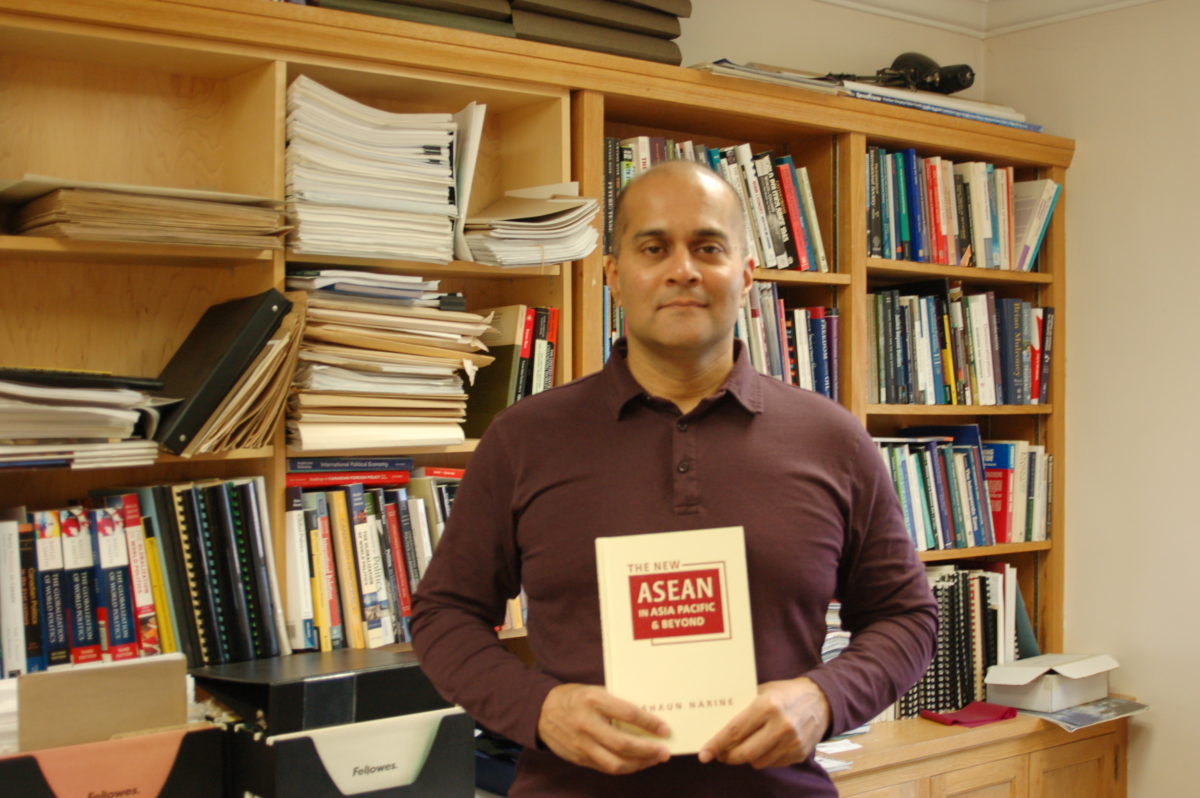Professor Shaun Narine travelled to Asia in 2007 to conduct research for a book he was writing. Now, more than a decade later, The New ASEAN in Asia Pacific and Beyond is finished.
“The problem with writing a political science book is that it’s a constantly moving target,” said the international relations professor.
“That’s one critical difference between us and say, history. We’re dealing with things that are temporary.”
Narine’s book was launched at St. Thomas University on Sept. 28. It’s a sequel to Explaining ASEAN: Regionalism in Southeast Asia. He discusses how the Association of Southeast Asian Nations (ASEAN) has grown and how the United States seems to be attacking their existence and efforts — through the trade war regarding the North American Free Trade Agreement.
“We don’t want to get stuck in a room with a rabid drunk, which pretty much is what the Americans are … we want diversity in our trading and the countries we deal with.”
ASEAN is a multilateral intergovernmental organization that formed in 1967. Thailand, Malaysia, Brunei, Singapore, Philippines, Indonesia, Vietnam, Laos, Cambodia and Myanmar are all members. Their goal is to work toward solving common problems regarding politics, economy, security, military, education and sociocultural integration.
The first half of the book is an evaluation of the organization and how it’s created its own growth. The second half follows with discussion of the Great Powers: the U.S., Russia, China, France and the United Kingdom and how they’re shaping the Asian Pacific region.
“I knew a fair amount about them already, but I had to learn about them in much greater detail.”
The amount of research he conducted was enough to write an entire book on the topic of each chapter. When asked how many hours he spent researching, he joked “I have no idea — thousands.” He spent a year writing just one chapter, because he had to juggle other work along with the project.
Narine studied ASEAN in the 1990s while completing his PhD at the University of Toronto and he decided to stick with it. He believed Asia would be an important place regarding politics moving forward. He was right.
“Asia Pacific is, objectively, the most important place in the world,” he said. “The weight of the world economy is shifting back to the Asia Pacific region and all, every single one of the major powers in the 21st century have a presence [there] — Americans, Chinese, Russians, they’re all there. They’re all interacting with each other in increasingly negative ways, frankly.”
He said America is trying to stop these countries from being leaders in certain areas like technology. China has a pollution problem and is trying to make electrical cars the norm, but the U.S. doesn’t want them to be the ones to spearhead this, he said.
Narine said Canada doesn’t want to get stuck in the middle of America’s mess — the country needs to break away from them.
Although it took him a decade to release his book, Narine is glad he waited, because circumstances have changed.
“The chapter I wrote on China was primarily about what a wonderful job [they] had done of alleviating regional fears about the Chinese rise and by the time 2010 rolled around, that was no longer true . . . [China] began to spook most of its neighbours … it undid a lot of the [progress] it made.”
Narine believes the most important interactions going on right now are happening in the Asian Pacific.
“I think the biggest story of the 21st century is probably going to be the emergence of China.”
“I’m glad it took me so long to do the book because I would have written this thing, it would have came out and it would be immediately out of date. Whereas now, I think I can say certain things that will stand the test of time.”
Most of the interviews he conducted with locals in Japan, Indonesia, Malaysia, Singapore, Philippines and Hong Kong were not relevant by the time publication rolled around. Still, he’s glad he made the trip because it provided him with context about those living in Asia and their political opinions. He feels you can’t write about a place unless you’ve experienced it.
Narine said the most pressing issues for the next century are being decided now.
“The global future for the next 100 years is being decided right now in North America and the Asia Pacific. And my book, peripherally, and in some pages, directly, touches on this.”

